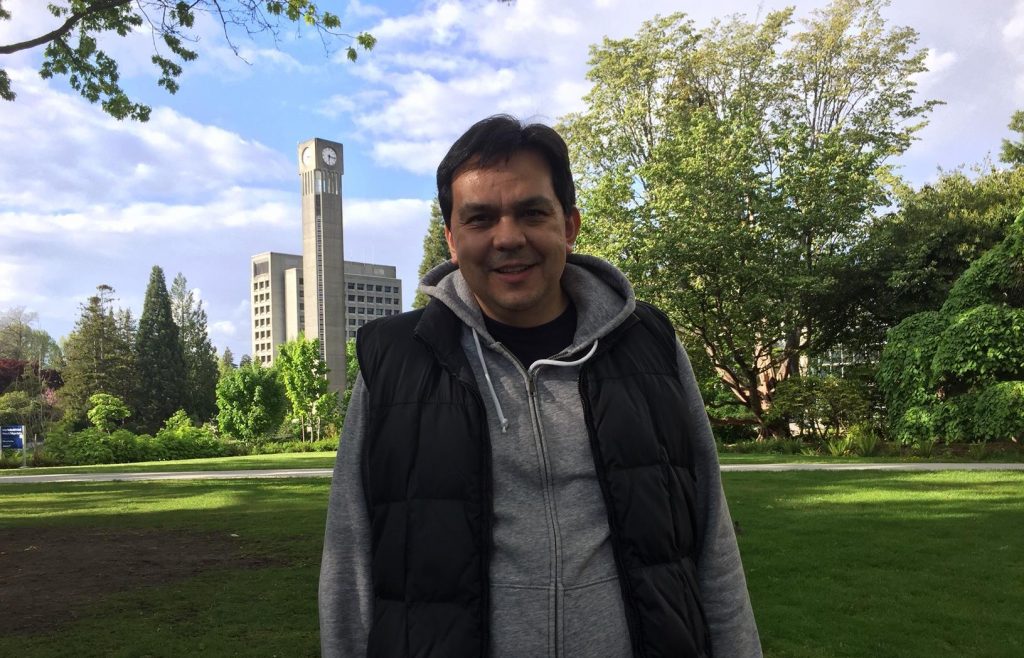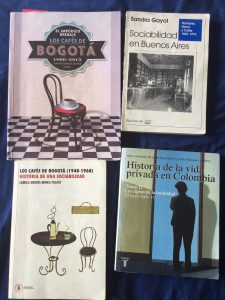Dr. Camilo Monje, former PhD student of Hispanic Studies, re-reads texts through the lens of “the café”, revealing new connections between Colombian writers that were formerly divided by the labels and specializations of traditional literary criticism.
Sections: Graduate Student Experience | Research


Dr. Camilo Monje in front of Buchanan Tower at UBC Vancouver campus.
Part 1: Graduate Student Experience
Why did you pursue graduate studies?
I pursued graduate studies because I wanted to work in the academic field as a university researcher and professor.
After finishing my Masters in 2010, I began working at Universidad de los Andes in Bogotá, Colombia, teaching Spanish for seven years. During part of this time, I coordinated the Department of Languages and the Spanish programs that the University offered.
This experience helped me decide to register for the PhD program, because I wanted to reconnect with the academic track, which I felt that I was losing at some point during my final years as administrator. I wanted to continue writing, researching, and teaching — the things that I enjoy the most.
What advice would you give to people who are discerning whether graduate school is for them?
It is important to follow your instincts and act accordingly in order to reach your personal and academic goals.
You need to like what you do. In the case of graduate studies, you need to love reading, writing and researching, because you will spend a lot of time doing these three things. In the end, if it was what you loved, you will be amazed by your accomplishments.
Why did you choose UBC?
I chose to study at UBC because I wanted to attend a good university that was located in a calm city and that supported family life. UBC allowed me to achieve that balance by enabling me to live on campus and by providing accessible childcare, amazing study spaces and great professors.
What was working with your graduate supervisor like?
Working with Dr. Jon Beasley-Murray was outstanding: he was always very organized and generous with his time. His work discipline led to timely feedback that reflected on the quality of my text and the successful fulfilment of my academic timeline. I finished my degree sooner than I expected, three years and four months in total, and this was the result of a supportive mentorship and the disciplined writing system that he modelled for me.
Part 2: Research


Examples of published research regarding Sociability, Private Life, and “Cafés”
What is your research topic?
My study is a re-reading of Colombian literature through the following concepts: field, sociability, and public and private space.
Instead of the traditional method used by literary criticism—division into schools, authors, and chronologies—my analysis uses the space known as the café to address the issue.
Thanks to the sociable nature of the café, it is possible to re-read many of the most important writings from this tradition, which are related and relocated within an expansive and cohesive literary field.
The social gatherings that brought Colombian writers together from the end of the colonial era are inserted in a process of continuities and interruptions throughout the 19th and 20th centuries. After reading this process under the lens of or by focusing on the café, it is possible to notice a new network of connections between different eras and different Colombian writers.
What questions do you address through your research?
My dissertation removes Colombian literature from the label it has been given or the specialization it has been attributed by literary criticism.
Instead, it is presented on a diachronic stage made up of flows and transitions where literary works either resonate beyond their time or resonate despite it.
In my dissertation titled titled El campo literario en Colombia: una lectura en clave de café:
- authors related to a political order can now be interconnected with novelists and poets;
- writers related to a school or a literary “ism” break down these borders through encounters that they have or that they recreate in their texts;
- traditional authors are re-read as being Avant-guard, and Avant-guard authors are re-read as being traditional;
- and canonical writers can be linked to schools or to writers who are considered as not being as important by literary criticism.
How does your research impact the wider community?
According to Professor Ignacio Sánchez Prado, my dissertation is:
“the first study about the institution of the literary café in Colombia and one of the very few in Latin America… It is a very valuable study of an institution that played a significant role in the development of literary practices but is rarely the focus of academic work… It is, compared to existing works, an innovative way of telling the story of literary writing on Colombia and providing refreshing readings of canonical authors like Silva and García Márquez.”
The café is a way of thematically uniting this diversity of Colombian texts and reading in a way that discovers writers’ associations or gatherings, as well as the fictional characters they describe in their works. This research shows a different, unpublished way of reading a collection of literary texts, which can be applied in different spatio-temporal contexts.
What drew you to this area of interest?
When I was an undergraduate student I took a class about Bogotá’s history. The final project for this class was to recreate the history of a place in the city. I chose a café: café San Moritz. I just loved the atmosphere of this space, where I spent most of my free time when I was a student. Without knowing it, this was the first step to my research project that continues today, after finishing my PhD dissertation titled “The Literary Field in Colombia: a Reading focusing on the Café.”
So, before coming to UBC, I was able to explore this area of interest through different ways. For example, I first worked with the concept of sociability as part of my Master’s thesis, which was titled “Bogotá’s cafés: the history of sociability (1948-1968)”, published by the Rosario University in 2011. I also wrote articles about cafés, like the one titled “The Ides of March” for the book The Indecent Drink: Bogotá´s Cafés (1866-2015), and another titled “Clubs and cafés: spaces of passing intimacy” for the History of the Private Life in Colombia.
I feel fortunate that a decision I made years ago drew me to UBC to continue (or restart) my connection with a topic that has shaped many of my academic activities.
Interested in Graduate Studies?
UBC’s MA and PhD programs in French and Hispanic Studies are currently accepting applications for the January 2021 intake. Applications are due June 15th (for international students) and July 31st (for Canadian and U.S. students).


